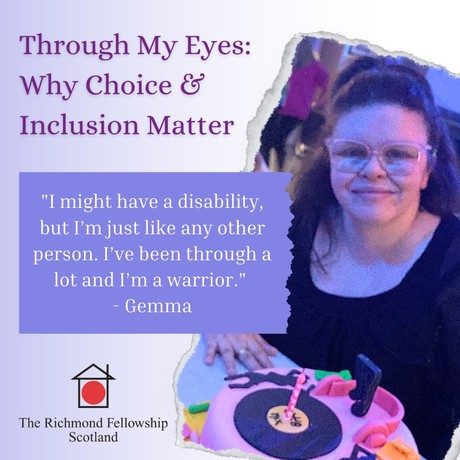Gemma's Story - Choice & Inclusion Matter
Gemma’s Story – The Importance of Choice & Inclusion
Meet Gemma, who has been supported by The Richmond Fellowship Scotland (TRFS) for over 20 years. She has Williams Syndrome, part of which means she experiences emotions more intensely and sometimes finds it challenging to recognise danger but that doesn’t hold her back! She embraces life to the fullest, always seeking new experiences and opportunities!
Gemma has a wide range of interests that keep her busy and fulfilled. She loves dancing, singing, going to Zumba, reading Tarot cards, learning Makaton and exploring the world of animals and nature. She also has a deep passion for languages and enjoys learning Spanish and German, expanding her skills whenever she can.
One of her biggest joys in life is travel and her holidays to Spain, especially Salou which is her favourite destination so far. From the beautiful scenery to the delicious food and welcoming people, she loves immersing herself in new cultures and planning her next adventure. For Gemma, travel isn’t just about the destination, it’s about the independence, confidence and joy that comes with experiencing the world.
She’s a proud member of the LGBTQIA+ community, a volunteer at the PDSA and a fan of RuPaul’s Drag Race. Her top Queen will always be The Vivienne, who sadly passed away in 2025 but left an incredible legacy using her own struggles with mental health to support and inspire others.
Gemma’s journey is one of choice, inclusion and empowerment. Values that should be at the heart of every care and support service.
“There are pros and cons to 24-hour care. Sometimes, you need your own space but the good side is that there is always someone there who cares about you, who will be there when things get tough. Without my support team I don’t know where I would be, I know I wouldn’t be able to do half the things I do now. They explain things to me when I don’t understand, they help me feel safe and they support me to live as independently as possible.”
For Gemma, having control over her life is not just important, it’s essential.
“I’m an independent 37 year old woman. I might have a disability, but I’m just like everyone else. Inclusion is so important for mental health, for communication and for being heard. People often assume that if someone is supported, they don’t have opinions and that’s not true. We all communicate in our own way and we all deserve to be listened to and treated with respect.”
Being able to voice her needs and be heard is incredibly important to Gemma. When she was feeling anxious and upset, she was able to recognise what she needed and went straight to her support team for help. Another time was when she experienced severe stomach pains, she advocated for herself, asking to go to the hospital. Thanks to the quick actions of her team, she got the medical care she needed as she was diagnosed with appendicitis.
“Being included in decisions makes me feel like everyone else. Not being included is very upsetting. Everyone deserves to feel heard.”
Through TRFS’s support, Gemma has developed emotional connections, improved communication and learned to manage her emotions in public spaces. However, she acknowledges that some challenges still exist, especially when it comes to relationships and personal privacy while receiving 24 hour care.
She is also passionate about LGBTQIA+ inclusion within social care.
“Things have improved a lot, and I feel more comfortable speaking about who I am but I think more training for staff would help. Sometimes, I don’t feel like I can talk about certain things in front of some people and that can make me uncomfortable. Having someone on my team who is a LGBTQIA+ friendly means so much to me. It gives me someone I feel safe talking to, learning from and sharing more about the community with.”
Gemma’s Advice to Others
For supported individuals: “You have the right to make choices about your life. Be happy, be proud of who you are and love yourself as others love you!”
For support staff: “Understand that disabilities affect people in different ways. Someone can be fine one moment and struggling the next. The way you support them in those moments is so important. Also, never exclude someone from a conversation, it makes them feel like they don’t matter.”
Commenting is now closed on this article.
